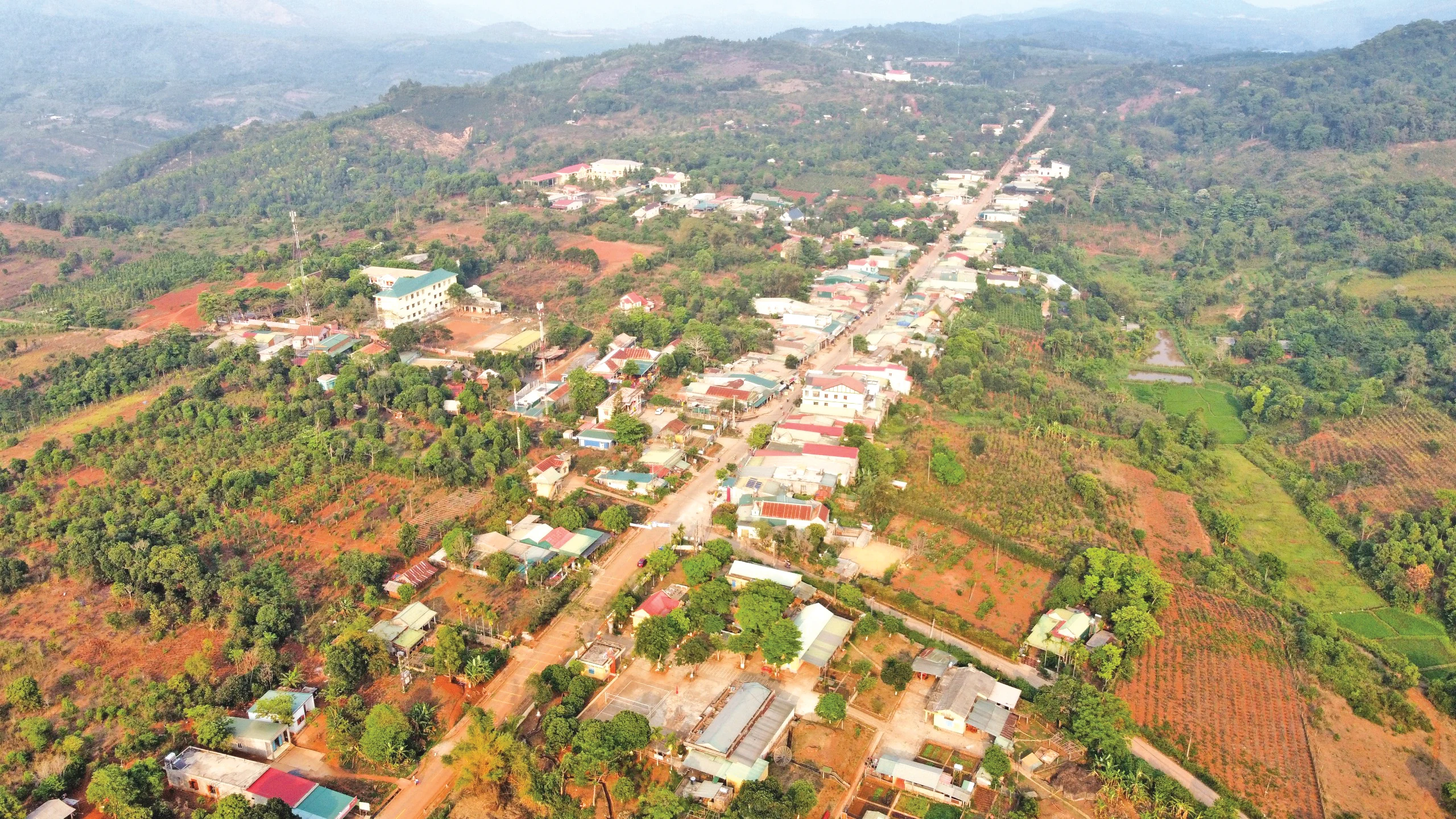{title}
{publish}
{head}
Quang Tri Newspaper is proud to feature an article by Vice Chairman of the Quang Tri Province People’s Committee Ha Sy Dong, highlighting the province’s efforts to effectively implement socio-economic policies for ethnic minority communities and residents in mountainous areas.
Vice Chairman of the Quang Tri People's Committee Ha Sy Dong

The socio-economic development of ethnic minority groups and mountainous areas has always been a strategic task. The 13th Congress of the Party has defined: "Focus on completing and effectively implementing ethnic policies in all areas, especially specific policies to address the difficulties of ethnic minorities in terms of production development, livelihood creation, employment, clean water, and sustainable settlement for ethnic minorities, especially in remote, isolated, and border areas...".

Coffee beans harvest in Huong Hoa District. Photo: T.T
The effective implementation of the National Target Program for the socio-economic development of ethnic minorities and mountainous areas in the period 2021-2030 is seen as the foundation to drive the success of national programs, ensuring their effectiveness, especially for the specific needs of ethnic minorities and mountainous areas in Quang Tri Province. This program contributes to fostering the self-reliance and self-improvement spirit of the ethnic minorities in developing their socio-economies and achieving sustainable multi-dimensional poverty reduction.
In recent years, under the leadership and direct guidance of the Provincial Party Committee, the People’s Council, and the Provincial People’s Committee, and with the collaboration of departments, sectors, and localities, the ethnic affairs work and ethnic policies have been effectively implemented. The Party committees, local authorities, and people have actively participated and created favorable conditions for the development of ethnic minorities, strengthening national unity. The Provincial Party Committee, the People’s Council, and the People’s Committee have focused on issuing many directives, resolutions, decisions, plans, and key programs related to ethnic policies and the National Target Program for socio-economic development in mountainous areas and ethnic minority regions, such as Conclusion No. 175-KL/TU dated December 6, 2021, and Resolution No. 149/2021/NQ-HĐND dated December 9, 2021, about the socio-economic development plan for 2022; Decision No. 220/QĐ-UBND dated January 18, 2022, and Decision No. 833/QĐ-UBND dated March 18, 2022, of the Quang Tri Provincial People’s Committee, issuing the key working program for 2022, assigning specific tasks to relevant levels and sectors for implementation.
In particular, 2022 marked the first year of the implementation of the National Target Program for the socio-economic development of ethnic minorities and mountainous areas under Decision No. 1719/QĐ-TTg dated October 14, 2021, by the Prime Minister (abbreviated as the program). This is a large program consisting of 10 projects covering multiple fields and led by various sectors. It integrates central government policies for ethnic minorities and mountainous areas from previous periods and adds new policies.
According to statistical data by the end of 2020, before the program’s implementation, there were 11,100 poor households in ethnic minority areas in Quang Tri, accounting for over 60% of the total poor households in the province and nearly 45% of the total number of ethnic minority households. With the implementation of the program, Quang Tri set a goal of increasing the average income of people in ethnic minority areas more than twofold by 2025 compared to 2020, with an annual poverty reduction rate of 4%-5%. To effectively implement the program, the Provincial People’s Committee has advised the Provincial People’s Council to issue resolutions and many important directives to guide the implementation, including resolutions on principles and criteria for capital allocation to implement the program, mechanisms for mobilizing resources, and integrating capital sources from other national programs with other programs and projects.
The documents also cover the organization of steering committees, the support units, the establishment of task forces, and the regulations for program operations. They define coordination mechanisms among sectors and levels during program implementation, assign responsibilities for carrying out 10 sub-projects of the program, and provide clear objectives, content, beneficiaries, and solutions for each task. Based on these approved plans, the Department of Ethnic Affairs, in coordination with the Departments of Planning and Investment and Finance, has advised on and allocated capital for the program for the 2021-2025 period and annually, in line with regulations.
During the implementation process, despite facing challenges due to both objective and subjective factors, the program’s steering committee and local sectors maintained high determination and worked together to push the program forward.
After nearly three years of implementation, the program has integrated multiple policies for ethnic minorities and mountainous areas, executed in the relevant districts. The socio-economic infrastructure in these areas continues to be improved according to new rural development standards. The economic structure has seen positive changes, with trade and services growing, and agricultural economy diversifying. The material and spiritual lives of ethnic minorities have been improved.
Basic infrastructure such as roads, schools, healthcare stations, irrigation systems, and clean water have been prioritized for investment. Direct support policies for the people have been implemented to develop household economies, increase income, create stable jobs, and contribute to sustainable poverty reduction. The poverty rate in ethnic minority areas by the end of 2023 compared to the end of 2022 reduced by 5.05% in 38 communes with ethnic minorities, 6.92% in 31 communes in ethnic minority and mountainous areas, and 7.47% in particularly difficult communes.

Huong Hoa District from above. Photo: T.T
However, the socio-economic development and poverty reduction in ethnic minority regions is a long-term task that requires time and persistence to achieve the set goals in both policy formulation and implementation. It is essential not to rush or focus solely on achievements, but rather to be patient and thorough in carrying out tasks.
In the future, Party committees and local authorities must fully grasp their leadership responsibilities, mobilize the involvement of the entire political system and society to succeed.
The role of the people, especially the poor, is crucial for the sustainability of the program. Therefore, it is necessary to stimulate the spirit of self-reliance and self-improvement in the people, combining this with government and community support policies to achieve the set goals. Public awareness and responsibility must be raised to enhance the implementation of Party guidelines, state policies, and laws on socio-economic development in ethnic minority areas. The quality of movements and campaigns on sustainable poverty reduction, new rural construction, and socio-economic development in ethnic minority areas must be improved.
Strengthening leadership, directing, and managing by local leaders is essential to improve the efficiency and effectiveness of government management in executing the program. Continuing to decentralize authority to the grassroots will create flexibility for localities and sectors in program implementation, ensuring it aligns with legal regulations, is transparent, and is easy to execute.
Comprehensive solutions for capital mobilization must be implemented to ensure full and timely resource allocation according to regulations. Sufficient local budget allocation should be ensured, and additional funding sources encouraged, including legal contributions from businesses, donations from domestic and international organizations, and participation from local people.
Investments should focus on priority areas according to local needs, solving pressing issues in each program concerning socio-economic infrastructure and meeting the production needs of ethnic minorities and rural areas.
Effective solutions for residential land, housing, and production land for ethnic minority people should be addressed, as well as settling populations in ethnic minority, mountainous, border, and disaster-prone areas. Vocational training and employment solutions for rural workers should be prioritized.
Facilitating access to preferential loans and providing guidance on their effective use for economic development should be prioritized for the most disadvantaged ethnic minority households, including those with veterans, children, and women.
Efforts to raise awareness and build cultural norms in rural areas should be strengthened, preserving and promoting the intangible and tangible cultural values of ethnic groups, combined with the development of rural tourism. Investments to complete and improve the use of cultural facilities should also be pursued.
In addition, inspections, monitoring, and evaluations of the National Target Program must be enhanced at all levels and sectors, from preparation to implementation, to ensure objectives are met, promptly detect and address negative behaviors, and prevent waste. This will help turn ethnic minority regions into prosperous, peaceful communities.
Ngoc Mai

QTO - The Party Committees, People’s Councils, People’s Committees, and Vietnam Fatherland Front Committees of Quang Binh and Quang Tri provinces on June...

QTO - Amid the continuous flow of history and the nation's ongoing development, Con Co Island District—a frontline island of the Fatherland in the East...